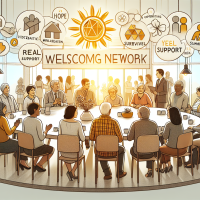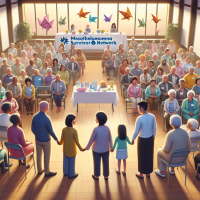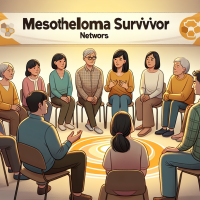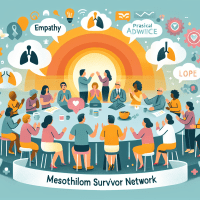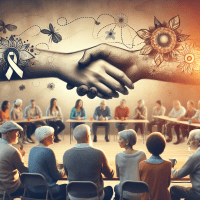Mesothelioma Survivor Network Events: A Compassionate Journey
Information current as of May 2025
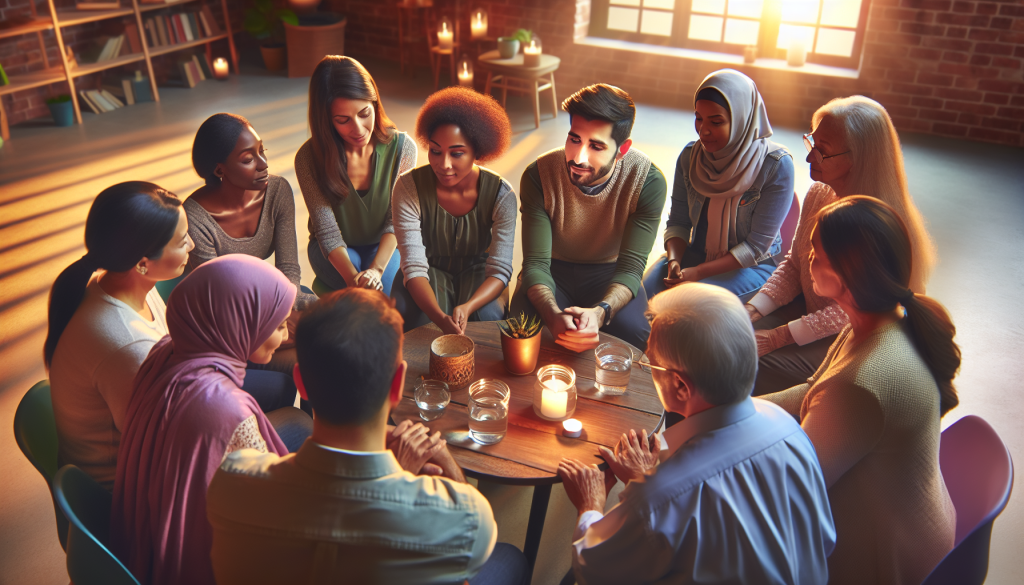
Welcome and Introduction
Hello, I’m a registered oncology nurse with over 10 years of experience caring for patients affected by Mesothelioma. I understand the emotional and physical challenges that come with a Mesothelioma diagnosis because I have walked beside many brave survivors and their loved ones. In this blog post, I offer heartfelt insights and practical advice on Mesothelioma survivor network events, support groups, and more. My goal is to empower you with knowledge and a genuine sense of connection, so you never feel alone on this journey.
Whether you are a patient, a caregiver, or a family member trying to navigate treatment and emotional hurdles, this guide is for you. Together, we explore how networking events and support groups can provide not only medical guidance but also deeply compassionate human connection, building community resilience during tough times.
Understanding Mesothelioma: Diagnosis, Staging, and Treatment Options
Mesothelioma is a rare cancer often linked to asbestos exposure. After your diagnosis, you may undergo biopsies such as thoracoscopy (a minimally invasive surgery using a camera) or thoracentesis (fluid removal from the pleura for analysis) to confirm the diagnosis. It is crucial to understand that these tests are designed to provide clarity on the nature of the disease, enabling an effective treatment strategy.
Mesothelioma Staging Explained
The staging system, generally defined as Stages 1 through 4, helps in determining the progression of the cancer and shaping treatment decisions:
- Stage 1: Cancer is localized and may be eligible for surgery.
- Stage 2: Cancer has started to spread, requiring a combination of treatments.
- Stage 3: More aggressive cancer spread, needing multimodal therapy.
- Stage 4: Advanced stage with widespread impact; focus shifts to palliative care.
I always encourage patients to have in-depth discussions with their medical team to fully understand what stage means for them and to explore all available options.
The Power of Mesothelioma Survivor Network Events
One of the most profound resources I have witnessed is the role of survivor network events. These events create an opportunity for mesothelioma patients, survivors, caregivers, and families to come together in a nurturing environment. Here are some of the key benefits:
- Emotional Support: Sharing stories and coping strategies can reduce feelings of isolation.
- Practical Advice: Learn about treatment options, clinical trials, and new research from experts.
- Community Bonding: Establishing long-term connections that offer ongoing care and encouragement.
- Resource Sharing: Information about financial aid, legal help, and counseling services is freely exchanged.
In my experience, attending these events has meant not only gaining vital information but also feeling understood by people who share your journey. It is a space where struggles are acknowledged with compassion, and hope is nurtured every day.
Exploring Event Types and Networking Opportunities
Mesothelioma Support Groups
Regular support groups can provide an ongoing forum to discuss challenges, share breakthroughs, and simply listen to stories that resonate with your own experience. Searching for trending queries like mesothelioma support groups for survivors can help you locate local gatherings.
Awareness and Fundraising Events
Awareness events and mesothelioma fundraising events are essential not only for improving public understanding of the disease but also for generating funding for research. I have seen these events foster strong community ties, and they often feature expert talks and personal testimonies that uplift everyone involved.
Conferences for Patients and Caregivers
Conferences, often referenced as mesothelioma conferences for patients and caregivers, bring together insights from medical professionals, innovative research findings, and strategies for managing day-to-day challenges. They often provide a mix of lectures, panel discussions, and interactive sessions. These events can be a turning point in how you approach treatment and personal well-being.
For more detailed insights on support options, you might consider reading our related article on Compassionate Mesothelioma Support Tips which delves into daily coping mechanisms and self-care practices.
Managing Emotional Wellness and Finding Resilience
As you navigate your mesothelioma journey, the emotional toll can be overwhelming. I have seen firsthand how important it is to address mental health alongside physical treatments. Here are a few strategies I often recommend:
- Mindfulness and Meditation: Simple mindfulness exercises help ground your thoughts and reduce anxiety. I personally find that taking a few minutes each day to sit quietly can foster inner peace.
- Open Communication: Share your feelings with trusted friends and family members, or consider joining therapy sessions. Honest dialogue can ease fear and promote healing.
- Resilience Workshops: Some survivor network events include workshops on resilience and coping, which provide structured techniques to help you navigate grief and uncertainty.
A Personal Reflection
From my heart to yours, remember that every step you take in understanding and embracing your emotions contributes to your healing journey. I know how hard it can be to open up, but you are not alone. Sharing even the smallest detail can bring unexpected comfort and support.
Integrating Clinical and Emotional Care: A Step-By-Step Guide
If you are new to mesothelioma events or are considering how to enhance your care, here is a clearly defined blueprint to help guide your next steps:
- Consult Your Healthcare Team: Begin with a thorough discussion about your current treatment plan. Ask questions about what each stage of mesothelioma means for reaching potential support resources.
- Research Local Events: Use search terms like upcoming mesothelioma awareness events 2025 and mesothelioma survivor network events near me to identify nearby gatherings.
- Attend and Engage: Having attended a few events myself, I recommend actively participating by sharing your story and asking for advice. This engagement fosters community bonds and new friendships.
- Explore Multidimensional Support: Look into complementary services such as counseling, financial planning, and legal consultation if necessary. While I always prioritize your emotional and medical well-being, these secondary resources can help alleviate additional burdens.
For further insights on legal or financial support tailored for mesothelioma patients, check out our article Mesothelioma Legal and Financial Support on our site.
Frequently Asked Questions about Mesothelioma Support and Events
I understand you may have many questions, so I’ve compiled answers to some of the most common concerns I hear from those in the mesothelioma community:
- 1. What types of mesothelioma survivor network events are available?
- There are various events ranging from support groups and awareness events to specialized medical conferences that provide in-depth insights into treatment options. These gatherings not only address medical concerns but also foster emotional healing and community building.
- 2. How can I find mesothelioma support groups near me?
- Search using terms like “mesothelioma support groups for survivors” or check with local cancer centers. Your oncologist may also provide recommendations for nearby groups.
- 3. Are these events open to caregivers and families?
- Absolutely. Many events are designed with caregivers and family members in mind, recognizing the importance of shared support in the healing process.
- 4. How do mesothelioma conferences support patients?
- Conferences provide access to expert talks, the latest research on treatment options, and practical advice on managing day-to-day challenges. They often create lasting networks among participants.
- 5. Can attending events have a positive impact on my mental health?
- Yes. Many survivors find that participating in these gatherings helps alleviate feelings of isolation and promotes overall mental well-being through shared experiences and mutual support.
- 6. What should I expect from a mesothelioma fundraising event?
- These events typically focus on raising awareness and funds for research, while also offering opportunities for community engagement and sharing personal stories. They are uplifting experiences that remind you that hope and solidarity prevail.
Final Thoughts and Next Steps
I want you to know that the journey through mesothelioma is challenging, but you are never alone. By attending survivor network events and engaging with supportive communities, you gain not only practical advice on treatment options but also emotional strength and hope. I encourage you to connect with local support groups, attend conferences, and actively participate in awareness and fundraising activities. Every step you take is a step towards flourishing together in the face of adversity.
Remember, comprehensive care includes not just the medical interventions, but also the healing power of support communities. If you ever feel overwhelmed, please reach out to healthcare professionals or trusted peers. I am here with you as a guide, sharing both my professional insight and my personal empathy to illuminate your path forward.
Thank you for reading this compassionate guide. Together, we will find strength, share hope, and build resilience one day at a time.
Words of Encouragement I’ve Found Helpful
Every challenge you face is a stepping stone toward greater strength. I encourage you to keep engaging, keep asking questions, and always remember that a supportive community is here with you every step of the way.


